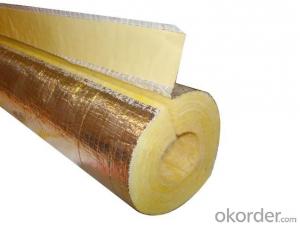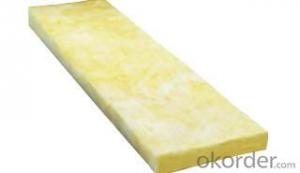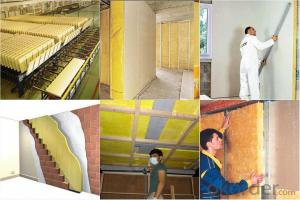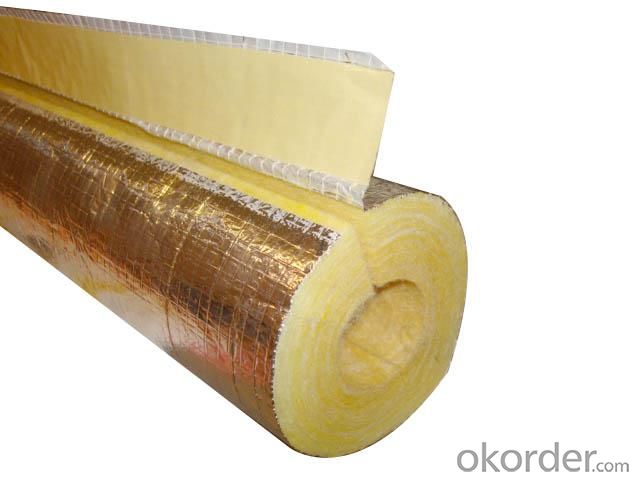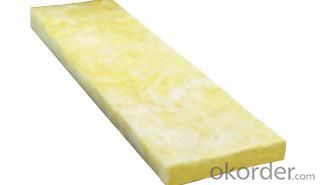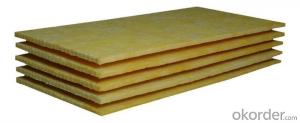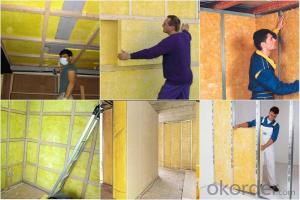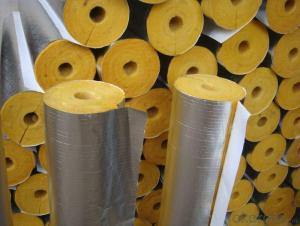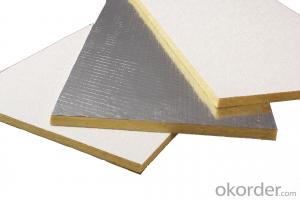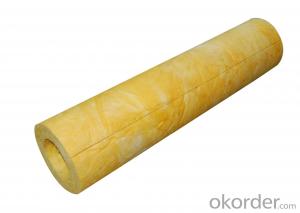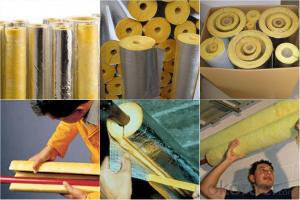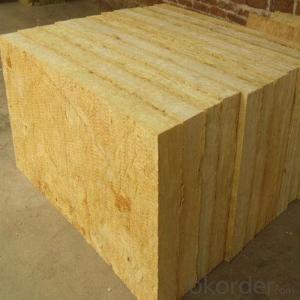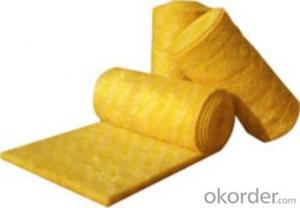Fiberglass Mat Tissue Heat Resistant Sound Absorbing Material Rock Wool Glass Wool Insulation
- Loading Port:
- Tianjin
- Payment Terms:
- TT OR LC
- Min Order Qty:
- 5000 m²
- Supply Capability:
- 20000 m²/month
OKorder Service Pledge
OKorder Financial Service
You Might Also Like
1.Description of Glass Wool Blanket:
Rock wool insulation board is based on superior melted basalt and diabase as the main raw material, through advanced centrifuge system of four-roller cotton process which pulls melted basaltic rockwool into a 4 ~ 7μm non continuous fibers followed by adding a certain amount of binder, dust laying oil, water repellent before settlement folding, curing, cutting and other processes, and then made into the products of different density depending on purpose of usage.
2.Main features of Glass Wool Blanket:
1. Excellent thermal insulation
2. Fireproof
3. Good sound absorption property
4. Stable and durable.
3.Glass Wool Blanket Images:
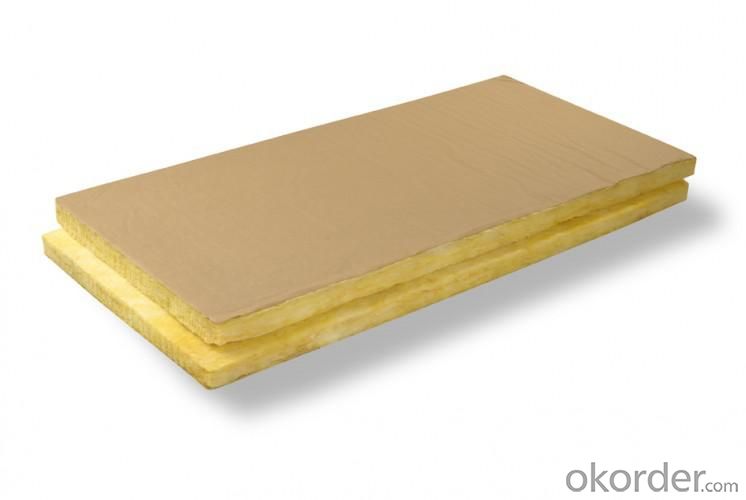
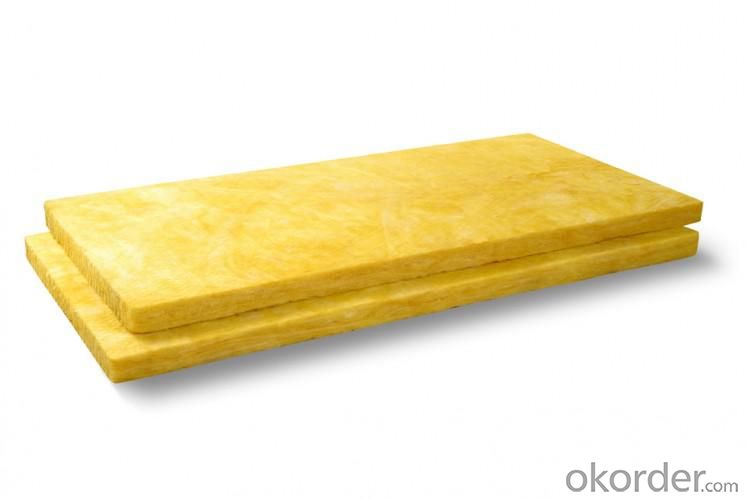
4. Glass Wool Insulation Blanket Technical Parameters:
Property | High/low temperature resistance, oil and fuel resistance, weathering resistance, O zone resistance etc. |
Shape | According to your requirement. |
Color | Any color is available ,according to your requirements. |
Material | NBR, CR, SBR, EPDM, IIR, NR, EP, Silicone, VITON etc. |
Hardness | 30-90ShoreA |
Delivery | In 10 days |
Packing | Plastic bag & carton box or according to your requirements. |
Application | Electronic field, industrial machine & equipment, house-hold appliance, telecommunication, automobile, medical equipment industry etc. |
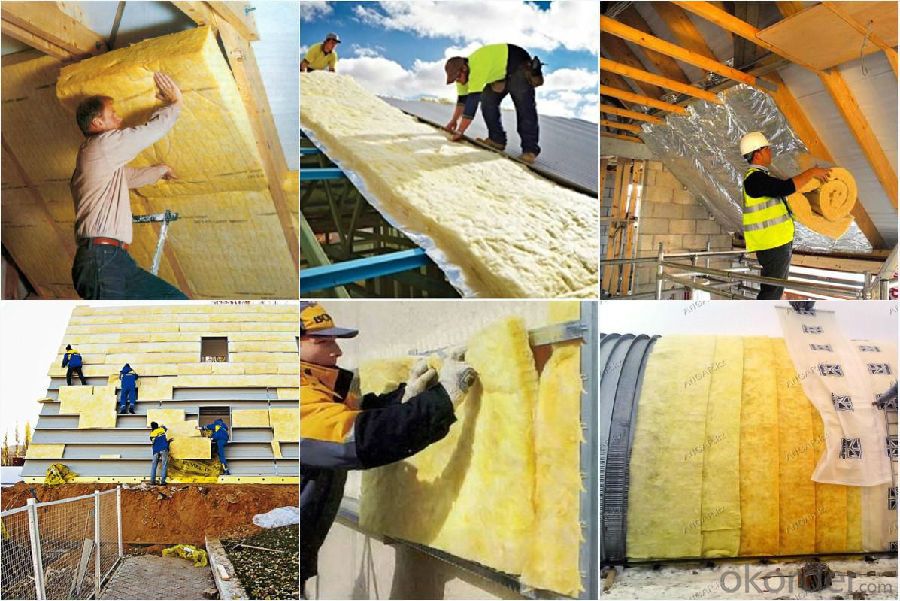
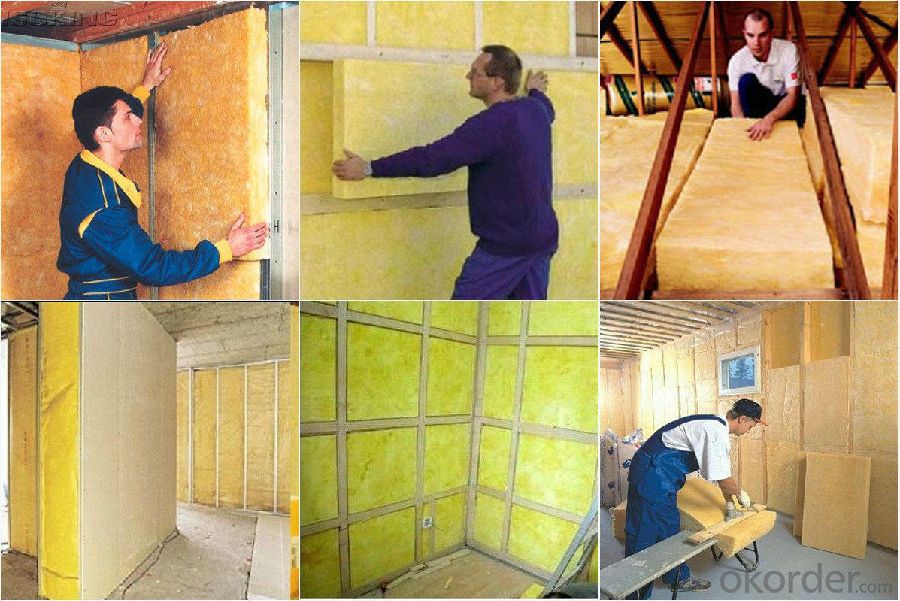
5.FAQ
We have organized several common questions for our clients,may help you sincerely:
①How about your company?
A world class manufacturer & supplier of Glass Wool Blanket is one of the large scale professional investment casting production bases in China,consisting of both casting foundry forging and machining factory. Annually more than 8000 tons Precision casting and forging parts are exported to markets in Europe,America and Japan. OEM casting and forging service available according to customer’s requirement.
②How to guarantee the quality of the products?
We have established the international advanced quality management system every link from raw material to final product we have strict quality test; We resolutely put an end to unqualified products flowing into the market. At the same time, we will provide necessary follow-up service assurance.
- Q: Are there any health risks associated with fiberglass mat tissue?
- Yes, there are some health risks associated with fiberglass mat tissue. Fiberglass contains tiny fibers that when inhaled can irritate the respiratory system and potentially cause lung damage. Prolonged or repeated exposure to fiberglass fibers can also lead to a condition called fiberglass dermatitis, which causes skin irritation and itching. Therefore, proper precautions such as wearing protective clothing and masks should be taken when handling fiberglass mat tissue to minimize the health risks.
- Q: Does fiberglass mat tissue require any special handling precautions?
- Yes, fiberglass mat tissue does require special handling precautions. It is important to wear appropriate protective gear such as gloves, goggles, and a respirator when working with fiberglass mat tissue to prevent skin, eye, and respiratory irritation. Additionally, it is recommended to work in a well-ventilated area to minimize exposure to fiberglass particles.
- Q: Is fiberglass mat tissue suitable for insulation in wastewater treatment plants?
- Yes, fiberglass mat tissue is suitable for insulation in wastewater treatment plants. Wastewater treatment plants often require insulation to prevent heat loss, control temperature, and protect against corrosion. Fiberglass mat tissue is a commonly used material for insulation in these facilities due to its high thermal resistance, excellent chemical resistance, and durability. It can effectively insulate pipes, tanks, and other equipment in wastewater treatment plants, ensuring optimal performance and energy efficiency. Additionally, fiberglass mat tissue is lightweight, easy to install, and cost-effective, making it a practical choice for insulation in these harsh environments.
- Q: How is fiberglass mat tissue used in the production of shower enclosures?
- The production of shower enclosures commonly utilizes fiberglass mat tissue due to its exceptional properties and advantages. This thin and flexible material consists of fine glass fibers that are randomly distributed and bonded together with a resin binder. To strengthen and enhance the shower enclosure, fiberglass mat tissue is primarily used as a reinforcement material. It is applied to the enclosure's surface to improve its strength, durability, and resistance to cracking or breaking. Initially, the fiberglass mat tissue is cut and sized according to the specific dimensions of the shower enclosure. It is then carefully placed or applied onto the enclosure's surface, typically through a process known as hand lay-up or spray-up. The mat tissue is strategically positioned to cover critical areas requiring reinforcement, such as corners, edges, and joints. Once the mat tissue is in position, a resin, usually polyester or epoxy, is applied over it. The resin penetrates the fiberglass mat tissue and bonds with the fibers, creating a solid and sturdy composite structure. This combination of resin and fiberglass provides additional strength and stability to the shower enclosure, making it more resistant to impact, stress, and water or humidity. Additionally, fiberglass mat tissue also contributes to the overall appearance of the shower enclosure. It helps achieve a smooth and uniform surface finish, eliminating imperfections and creating an aesthetically pleasing look. The mat tissue can be easily molded or shaped to match different designs and styles, enabling manufacturers to produce shower enclosures of various shapes, sizes, and patterns. In conclusion, fiberglass mat tissue plays a crucial role in the production of shower enclosures by offering reinforcement, strength, durability, and aesthetic benefits. This versatile material enhances the overall performance and visual appeal of the enclosures, ensuring they can withstand daily use and maintain their quality over time.
- Q: Does fiberglass mat tissue require any special surface treatments before application?
- Yes, fiberglass mat tissue does require special surface treatments before application. These treatments are necessary to ensure proper adhesion and bonding between the fiberglass mat tissue and the substrate it is being applied to. One common surface treatment is the application of a primer or bonding agent. This helps to improve the bond strength between the fiberglass mat tissue and the substrate. The primer or bonding agent is typically applied to the substrate and allowed to dry before the fiberglass mat tissue is applied. Another surface treatment is the removal of any loose or flaking material from the surface of the substrate. This can be done through mechanical methods such as sanding or grinding, or by using a chemical treatment to dissolve or remove the unwanted material. This step is important to create a clean and smooth surface for the fiberglass mat tissue to adhere to. In some cases, the surface of the substrate may need to be roughened or etched to provide a better bonding surface for the fiberglass mat tissue. This can be done using abrasives or chemical etching agents, depending on the type of substrate being used. Overall, the specific surface treatment required for fiberglass mat tissue will depend on factors such as the type of substrate, the desired bond strength, and the application method being used. It is important to follow the manufacturer's instructions and recommendations for surface preparation to ensure a successful application and long-lasting bond.
- Q: Is fiberglass mat tissue resistant to solvents?
- Yes, fiberglass mat tissue is generally resistant to solvents.
- Q: What is the weight range of fiberglass mat tissue?
- The weight range of fiberglass mat tissue can vary depending on the specific product and its intended application. Generally, fiberglass mat tissue can range in weight from around 20 grams per square meter (gsm) to 100 gsm or more. Thinner and lighter fiberglass mat tissues are often used for applications such as insulation or as a reinforcing layer in composite materials, while heavier fiberglass mat tissues are typically used for more demanding applications such as roofing or flooring. It is important to note that the weight range can also be influenced by factors such as the type of resin used, the desired strength or stiffness of the final product, and any specific requirements or specifications for a particular project.
- Q: Can fiberglass mat tissue be used for roofing applications?
- Certainly, roofing applications can utilize fiberglass mat tissue. This lightweight and flexible material finds widespread use in the construction industry for a multitude of purposes, with roofing being one of them. It serves as a reinforcement layer, bolstering the strength and durability of roofing systems. Typically, the fiberglass mat tissue is saturated with bitumen or other waterproofing substances to establish a water-resistant shield atop the roof. Additionally, it contributes to augmenting the fire resistance and thermal insulation characteristics of the roof. Furthermore, fiberglass mat tissue's resistance to mold, mildew, and other prevalent roofing problems makes it an excellent option for roofing applications.
- Q: What are the potential health hazards associated with working with fiberglass mat tissue?
- Working with fiberglass mat tissue can pose several potential health hazards due to the nature of the material. One primary concern is the inhalation of fiberglass particles, which can cause respiratory issues. When fiberglass is cut or handled, it releases small particles into the air that can be easily inhaled. Prolonged exposure to these particles may lead to throat and lung irritation, coughing, and difficulty breathing. Another potential health hazard associated with fiberglass mat tissue is skin irritation. The tiny fibers from the material can irritate the skin upon contact, causing redness, itching, and rashes. In some cases, prolonged exposure or repeated contact with fiberglass can result in more severe skin conditions such as dermatitis. Furthermore, fiberglass mat tissue can also cause eye irritation and damage. If fibers come into contact with the eyes, they can cause redness, itching, watering, and even corneal abrasions. It is important to wear appropriate eye protection, such as goggles, to prevent any potential eye injuries while working with fiberglass. To mitigate these potential health hazards, it is crucial to follow safety guidelines and use personal protective equipment (PPE) when working with fiberglass mat tissue. This includes wearing a respirator mask to prevent inhalation of particles, using gloves and protective clothing to minimize skin contact, and wearing safety goggles to protect the eyes. Regular cleaning and good hygiene practices are also essential to minimize any potential health risks associated with fiberglass. It is important to clean work areas properly to remove any loose fibers, and to wash hands and exposed skin thoroughly after working with fiberglass. Overall, while working with fiberglass mat tissue can present potential health hazards, taking appropriate safety precautions and following safety guidelines can significantly reduce the risk of any adverse health effects.
- Q: How is fiberglass mat tissue bonded to surfaces?
- Fiberglass mat tissue is commonly bonded to surfaces using adhesive materials. The bonding process involves applying the adhesive onto the surface where the fiberglass mat tissue is to be attached. The adhesive is typically a two-part epoxy resin or a specialized fiberglass adhesive that is specifically designed for bonding fiberglass materials. The adhesive is mixed according to the manufacturer's instructions and then spread evenly onto the surface using a brush, roller, or trowel. The fiberglass mat tissue is then carefully placed onto the adhesive-covered surface and pressed down firmly to ensure proper adhesion. The adhesive is left to cure for the recommended amount of time, allowing it to harden and create a strong bond between the fiberglass mat tissue and the surface. This bonding method ensures that the fiberglass mat tissue is securely attached to the surface, providing reinforcement, protection, or other desired properties depending on the application.
Send your message to us
Fiberglass Mat Tissue Heat Resistant Sound Absorbing Material Rock Wool Glass Wool Insulation
- Loading Port:
- Tianjin
- Payment Terms:
- TT OR LC
- Min Order Qty:
- 5000 m²
- Supply Capability:
- 20000 m²/month
OKorder Service Pledge
OKorder Financial Service
Similar products
Hot products
Hot Searches
Related keywords
